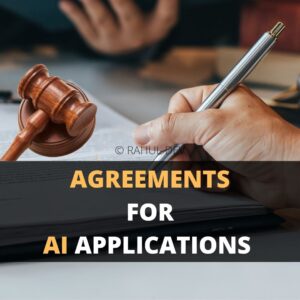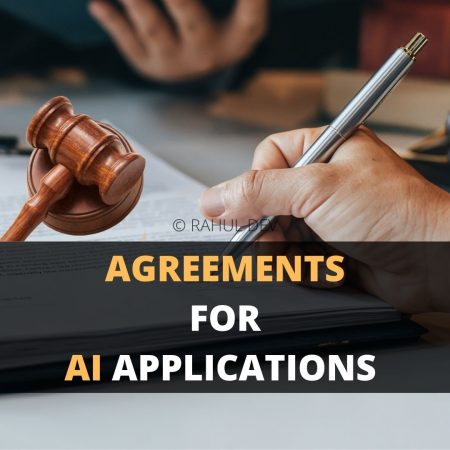AI Applications
Explore the Process to Write Strong Agreements for AI Projects

Understand Practical Aspects
Understand how to protect user data

Explore the Process to Write Strong Agreements for AI Projects

Understand how to protect user data

Protect your innovations across multiple countries and create strong patent portfolio to boost business valuation
Local and global brand protection through international trademark registrations
Extensive research and business writing for technical whitepapers and B2B content products
Writing Privacy policy for AI applications along with Terms of Use for AI applications require significant exposure towards unique skills covering innovation, business strategy, patents, and legal agreements. The drafting of legal documents for AI applications is majorly supported by a comprehensive understanding of the intricate legalities surrounding AI applications that are further strengthened while writing patent for AI applications. Protecting user data and ensuring data compliance with stringent regulations like the GDPR has shifted from being a best practice to an imperative standard. Accordingly, it becomes important to review the significance of robust Privacy Policies and Terms of Service (ToS) tailored for AI applications. These documents play a critical role in safeguarding user data, ensuring legal compliance, and promoting trust between users and service providers for developing innovative AI products.
This article covers following topics:
Importance of Legal Documents in AI
Drafting AI-Specific Legal Documents
Implementation of GDPR-Compliant AI Privacy Policy
Addressing User Data Challenges in AI Applications

Privacy Policies and ToS are important legal documents that define the user’s rights and the service provider’s obligations. In the context of AI applications, the continuous processing and analysis of user data demand heightened transparency and accountability. These documents serve as a formal pledge of trust and openness between the user and the service provider. By comprehensively drafting these legal documents for AI startups, the parties gain clear insights into user data usage in AI, ensuring adherence to AI data privacy norms and establishing strong guidelines for user data management.
Creating AI-specific Privacy Policies and ToS demands an in-depth understanding of the unique dynamics involved in AI data usage. These documents must address crucial aspects such as AI data security, protection of user data, and compliance with evolving AI data privacy laws. Beyond legal compliance, these policies should emphasize ethical AI practices that respect user privacy and promote a sustainable AI ecosystem. This approach ensures that AI applications can operate transparently and responsibly, for gaining greater user trust and corporate accountability. Drawing from my extensive experience in AI, blockchain, and data science, as well as my background in patent protection and technology law, I regularly advise clients regarding the important role of well-written AI-specific Privacy Policies and Terms of Service (ToS) for ensuring responsible AI deployment. A recent study by the AI Now Institute highlights the importance of addressing AI data security and compliance with regulations like the GDPR and CCPA, as AI systems heavily rely on vast amounts of user data (Crawford et al., 2019). Moreover, Gartner predicts that by 2023, 75% of large organizations will hire AI specialists to ensure ethical AI practices (Gartner, 2021), underlining the growing need for expert guidance in this domain.
A compelling case study can be seen in the journey of a European AI startup that sought our consulting expertise to revamp their Privacy Policy and ToS in line with GDPR requirements. The primary challenge was to articulate the sophisticated data processes employed by their AI algorithms in a manner that was both legally sound and user-friendly. By reengineering their Privacy Policy, we successfully delineated how user data was accessed, analyzed, and stored by their AI systems, thus ensuring GDPR compliance and enhancing transparency and trust among their user base.
The same AI startup faced substantial challenges concerning user data management due to the diverse methodologies of AI data collection. Our solution was to devise a comprehensive data management strategy covering data collection, processing, storage, and deletion procedures. This strategy ensured continuous compliance with legal standards while maintaining the integrity of user data across their AI operations. This approach not only mitigated potential data privacy risks but also streamlined their data governance practices.Effectively drafting AI-specific legal documents begins with a thorough analysis of the AI application’s data handling practices. The first step involves identifying and categorizing the types of data collected and their specific uses within the AI process. Mapping out a clear data governance model, including roles and responsibilities for data management and any third-party data sharing provisions, establishes accountability. Transparency is critical and legal documents must be written clearly, avoiding legal jargon, to help users understand and control their data use. Continuous monitoring and regular updates to the privacy documents are essential to align with evolving AI technologies and data privacy regulations. Integrating clear, straightforward language enhances user comprehension and compliance. Incorporating mechanisms for user feedback can help refine these documents, ensuring they remain relevant as AI functions expand.
Privacy Policies and Terms of Use, along with User Agreements, are fundamental to the legal and ethical framework governing AI applications. Precisely crafted legal documents are crucial, ensuring compliance, safeguarding user data, and cultivating the trust essential for the success of AI platforms. Innovators must focus on drafting transparent, user-centric legal documents to foster trust and secure informed user consents. This focus on legal documentation is critical for maintaining growth and adhering to legal and ethical standards.
Drawing from my extensive background in legal agreements within the realm of emerging technologies like AI, I guide organizations through the intricate landscape of legal compliance and data protection. My method combines rigorous legal analysis with strategic business insights, enabling entities to meet regulatory standards and drive business innovation and growth. For instance, a study by McKinsey noted that effective AI privacy policies can reduce compliance costs by up to 30% and increase user trust by 25%. Organizations must prioritize AI data security, addressing both GDPR compliance for AI and broader data privacy laws for AI. By incorporating robust Privacy Policy for AI Applications and Terms of Use for AI Applications, companies can ensure they not only meet the necessary legal requirements but also position themselves as trustworthy, transparent, and ethical in their AI deployments.
Industry best practices recommend designing agreements with flexibility to accommodate changes in project scope, ensuring alignment with business goals throughout the project lifecycle. Clear communication protocols and milestone-based payments enhance mutual understanding and collaboration. Meticulously crafted clauses, compliant with legal standards, help mitigate risks and reduce ambiguities. Regular review and updates of agreements are essential to keep pace with evolving legal and business landscapes, ensuring continuous protection and functionality.
Drawing from my extensive experience as a Corporate Counsel at Seahawk Media, where I handled global legal issues across the United States, Asia, and Europe, I regularly emphasized the importance of customizing agreements to address the unique challenges of cross-border transactions. This role involved negotiating and structuring commercial contracts covering software development, technology licensing, SaaS, IT services, product development, and intellectual property transactions that enabled me to provide comprehensive legal risk assessments and dispute resolution strategies tailored to each client’s specific needs. As an expert featured in over 50 national and international publications, I stay abreast of the latest industry trends and regulatory changes, ensuring that my clients’ agreements remain robust, adaptable, and fully compliant with evolving legal standards across multiple jurisdictions.
Software development agreements in India are integral to safeguarding business interests, requiring expert knowledge to draft effectively. My role as an experienced business attorney and technology lawyer is to ensure that these agreements are not only legally compliant but also strategically crafted to meet clients’ business goals. As an experienced software attorney with a specialization in business strategy, innovation, patents, and legal agreements, I deliver expertise in managing the complexities of Indian and international law. My consultancy services ensure that clients’ software development agreements are legally sound and strategically advantageous, supporting their operational success and long-term growth in the competitive tech industry.

As a business coach and thought leader, I cannot emphasize enough the importance of innovation, new software patents, mobile apps, and patents for tech companies, startups, and entrepreneurs. The world is rapidly evolving, and staying ahead of the curve is vital for success. Embracing technological advancements such as blockchain and AI can unlock unprecedented opportunities, streamline operations, and propel businesses into the future with competitive valuation via intangible assets.
Click Here for AI Startup Valuation Guide.
For instance, blockchain technology can revolutionize supply chain management and secure data sharing wherein innovative business models are explained to the audience via technical whitepapers, while AI can automate and optimize decision-making processes. Mobile apps are no longer just a luxury; they have become essential tools for engaging customers and offering personalized experiences. Furthermore, securing digital innovation patents is crucial for protecting intellectual property, fostering innovation, and maintaining a competitive edge. By investing in these areas, businesses can position themselves as industry pioneers and pave the way for a prosperous future after thoroughly conducting the due diligence and reviewing the legal opinion letters, which in case of digital assets can assist in determining the tokens as utility assets or coins as utility tokens before listing the assets at an exchange.
Our team of advanced patent attorneys assists clients with patent searches, drafting patent applications, and patent (intellectual property) agreements, including licensing and non-disclosure agreements. Advocate Rahul Dev is a Patent Attorney & International Business Lawyer practicing Technology, Intellectual Property & Corporate Laws. He is reachable at rd (at) patentbusinesslawyer (dot) com & @rdpatentlawyer on Twitter.
Quoted in and contributed to 50+ national & international publications (Bloomberg, FirstPost, SwissInfo, Outlook Money, Yahoo News, Times of India, Economic Times, Business Standard, Quartz, Global Legal Post, International Bar Association, LawAsia, BioSpectrum Asia, Digital News Asia, e27, Leaders Speak, Entrepreneur India, VCCircle, AutoTech).
Regularly invited to speak at international & national platforms (conferences, TV channels, seminars, corporate trainings, government workshops) on technology, patents, business strategy, legal developments, leadership & management.
Working closely with patent attorneys along with international law firms with significant experience with lawyers in Asia Pacific providing services to clients in US and Europe. Flagship services include international patent and trademark filings, patent services in India and global patent consulting services.
Global Blockchain Lawyers (www.GlobalBlockchainLawyers.com) is a digital platform to discuss legal issues, latest technology and legal developments, and applicable laws in the dynamic field of Digital Currency, Blockchain, Bitcoin, Cryptocurrency and raising capital through the sale of tokens or coins (ICO or Initial Coin Offerings).
Blockchain ecosystem in India is evolving at a rapid pace and a proactive legal approach is required by blockchain lawyers in India to understand the complex nature of applicable laws and regulations.